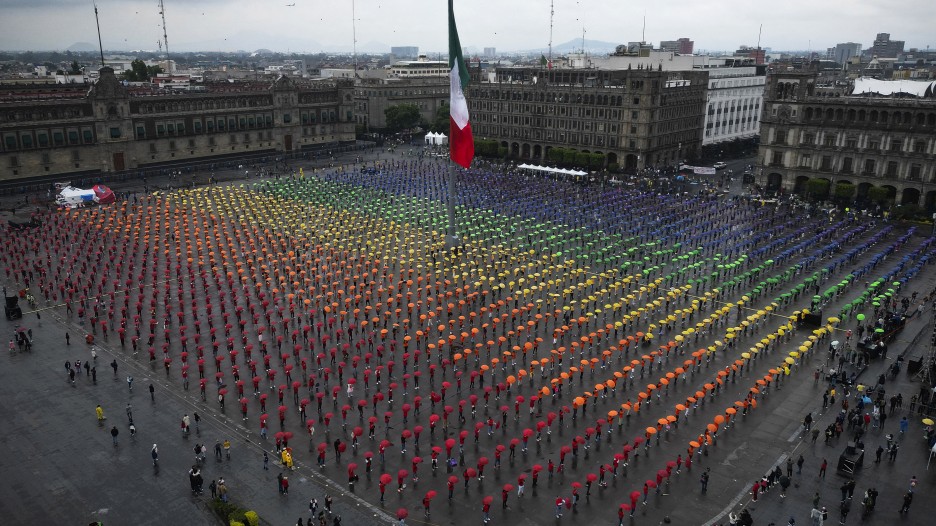Largest Human Pride Flag Ever Made by Mexican LGBTQ Activists Sets Global Record
The colorful formation draped the historic Plaza de la Constitución, capturing global attention and shattering previous records.

In celebration of Pride Week, more than five thousand LGBTQ+ activists converged on Mexico City's Zócalo to form the world's largest human LGBT flag. Under a shower of rain and brandishing vibrant umbrellas, the colorful formation draped the historic Plaza de la Constitución, capturing global attention and shattering previous records.
Mexico City Mayor Clara Brugada joined the crowd led the choreography. She said during the event that "Mexico City is and will continue to be the city of rights and freedoms. This monumental image we draw with our bodies and colors will be a powerful message to the country and the world. Mexico City is the capital of pride, diversity, peace, and transformation."
🌈 ¡Lluvia de orgullo en el Zócalo!
— El Sol de México (@elsolde_mexico) June 22, 2025
Ni la tormenta detuvo a las más de 6 mil personas que formaron una enorme bandera #LGBT+ en el corazón de la #CDMX.https://t.co/9kW64sZLXH
📷 Nadya Murillo | El Sol de México pic.twitter.com/2K0UmRuoNx
Organized by the government of Mexico City, the event, the largest of its kind in Mexican history, lasted two hours, starting at 10:30 am, on June 22, with participants moving in unison to the rhythm of the song 'A quién le importa' by Alaska y Dinarama. The event was recorded via drone, and the images and videos went viral on social media, with many expressing their surprise at the event not being canceled due to the weather. In a powerful display of resilience and resourcefulness, the activists dealt with unexpected rain by bringing umbrellas corresponding to their color in the giant flag to do the performance.
Mexico City has long been fighting for LGBTQ+ rights, making homosexuality legal in 1871 under French occupation. Mexico City was also the first Latin American city to legalize same-sex marriage in 2009. However, the Frente de Liberación Homosexual, founded in 1971 by Nancy Cárdenas, was Mexico's first gay liberation movement, had to operate clandestinely under repressive political conditions.
Across Latin America, trans and non-binary people still face high levels of violence, and Mexico has one of the highest trans murder rates in the world. In 2022, more than 95% of homicides in Mexico went unpunished. For the murders of transgender women, the figure is thought to be even higher. City officials passed a landmark transfemicide law in July 2024, with murders targeting trans people carrying a prison sentence of up to 70 years.
The visual performance was part of the city's Pride Month programming and served as a prelude to the annual Mexico City Pride March, which will take place on Saturday, June 28. In recent years, the march has drawn crowds of over 1 million, making it one of the largest Pride celebrations in Latin America.
Originally published on Latin Times





